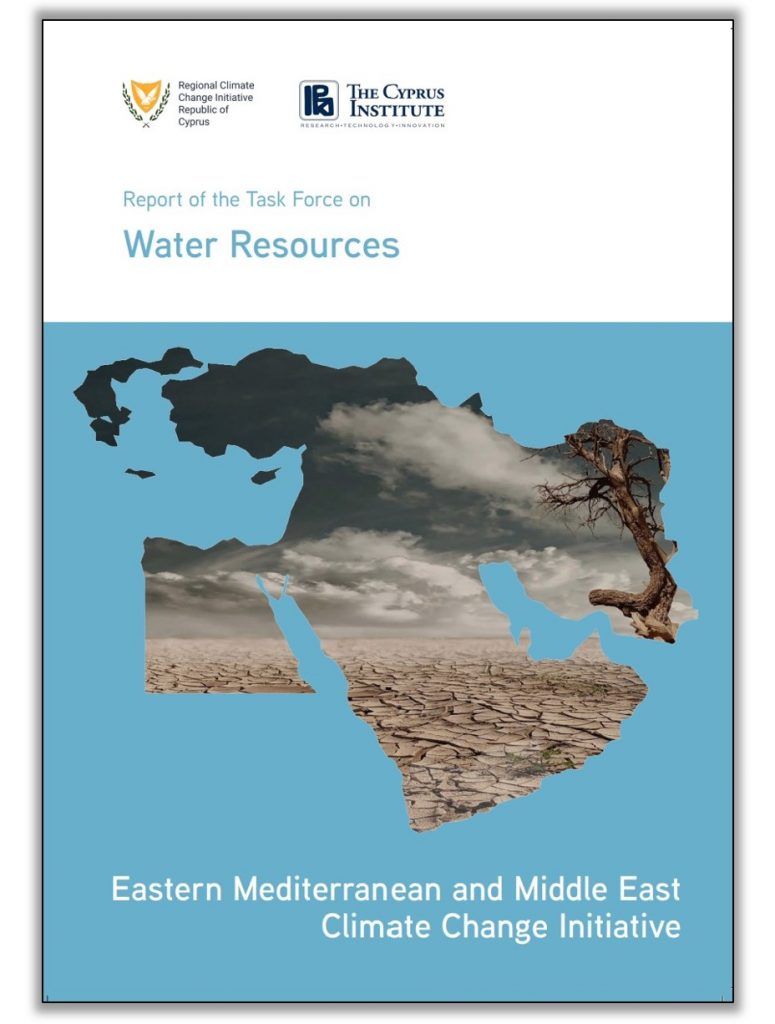
Water Resources
The majority of countries in the EMME region suffer from water scarcity. Climate change projections are showing a future with reduced precipitation and more frequent and longer droughts, stressing the water resources situation further. The report assesses the current state of water resources in the EMME region and the challenges imposed by climate change. It uses a conceptual framework to identify research and policy needs for achieving climate resilience and water security. The report reviews national climate change adaptation strategies and evaluates the implementation and effectiveness of water-related adaptation policies and measures across the countries of the EMME region.
The report deals with the challenges and solutions for the water management sector in the EMME region, such as the need for enhancing water use efficiency, water demand management, cooperation on shared water resources, reforming current water management policies and practices and the implementation of a climate-water-energy-food nexus approach. Research and policy issues related to the use of non-conventional water resources, such as desalination and treated wastewater, which are increasingly contributing to the water needs of the region, are identified. The development and sustainability of these resources requires environmental, energy and other externalities to be considered while carefully exploring and enlarging the potential of such options. Improving and expanding non-conventional options demands decreasing their costs (financial, economic, health and environmental) for their effective employment.
The report also stresses the importance of improving awareness and climate change-water education and highlights the need for the consideration of diverse sources of financing in order to offer broader solutions to the problems faced in the water sector.
(Click here to download the report in .pdf format)
Abstract from the Report of the Task Force on Water Resources
Task Force
This report surveys the state of water resources in the Eastern Mediterranean and Middle East (EMME) and the challenges imposed by climate change on a water-scarce region.
Reviewing national climate change adaptation strategies and evaluating the effectiveness of water-related adaptation policies and measures across the countries of the region, the report identifies gaps in research, policy and knowledge related to climate adaptation in the water sector.
Hydrologic modelling studies demonstrate that reduced rainfall, higher temperatures and greater evaporative demand will increase water-supply risks and water-quality problems. The climate adaptation measures of national adaptation strategies and plans reveal a good understanding of these threats, but implementation and financing have not kept pace.
The report applies a conceptual framework for achieving climate resilience and water security in the region, which recognises the systemic aspects of climate change, water scarcity and shared water resources in the region. The framework’s six lines of action for climate resilience and water security are governance; regional cooperation; finance; research and technology; reconstruction and resilience; and capacity development. Research initiatives should consider the application of the climate-water-energy-food nexus for improving water governance and achieving climate resilience and water security.

Task Force Coordination
Prof. Fadi Comair, The Cyprus Institute, Cyprus; previously Ministry of Energy and
Water, Lebanon
Prof. Adriana Bruggeman, The Cyprus Institute, Cyprus
Cyprus Institute Liaison Scientist
Dr. Elias Giannakis
Task Force Members
Dr. Amr AbdelMeguid, Center for Environment and Development for the Arab Region and Europe (CEDARE), Egypt
Prof. Mohamed Abdulrazzak, Taibah University, Saudi Arabia
Mrs. Laheab Al Maliki-Abbas, University of Al-Qasim Green, Iraq
Prof. Mohammad Al-Saidi, Qatar University, Qatar
Prof. Z. Selmin Burak, Istanbul University, Turkey
Dr. Carol Chouchamni Cherfane, United Nations Economic and Social Commission for Western Asia (ESCWA), Lebanon
Mr. Vangelis Constantianos, Global Water Partnership – Mediterranean (GWP-Med),
Greece
Dr. Abdullah Droubi, Deutsche Gesellschaft für Internationale Zusammenarbeit (GIZ), Damascus
Prof. Mutasem El Fadel, Khalifa University, United Arab Emirates
Prof. Emad Al-Karablieh, The University of Jordan, Jordan
Dr. Jauad El Kharraz, Regional Center for Renewable Energy and Energy Efficiency (RCREEE), Egypt
Prof. Maria Mimikou, National University of Athens, Greece
Dr. Ayman Rabi, Palestinian Hydrology Group, Palestine
Prof. Waleed K. Zubari, Arabian Gulf University, Bahrain

